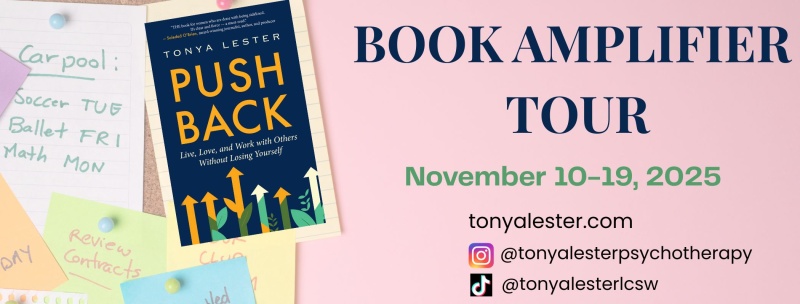Book Extract: Push Back: Live, Love, and Work with Others Without Losing Yourself by Tonya Lester
 Please join me in welcoming Tonya Lester to Novel Kicks and the blog tour for her book, Push Back: Push Back: Live, Love, and Work with Others Without Losing Yourself.
Please join me in welcoming Tonya Lester to Novel Kicks and the blog tour for her book, Push Back: Push Back: Live, Love, and Work with Others Without Losing Yourself.
What happens when kindness crosses into self-erasure? That’s the question therapist Tonya Lester explores in her debut book, Push Back: Live, Love, and Work with Others Without Losing Yourself.
Lester’s work is grounded in the realities of everyday relationships — marriages, friendships, families, and workplaces — where unspoken expectations often pull people into silence or compliance. With candor and compassion, she explores why so many women struggle to express anger, say no, or ask for what they need. Push Back combines research-backed insight with real-life case studies and guided reflections that help readers recognize the difference between keeping peace and losing themselves in the process. Lester doesn’t teach readers to be louder — she teaches them to be clearer. Her message is practical and deeply encouraging: your boundaries can coexist with love.
Tonya has kindly shared an extract with us today. We hope you enjoy.
*****beginning of extract*****
It’s OK to be Difficult
Years ago, I read a magazine story about an experienced climber who nearly died falling down a mountain. She’d forgotten the crucial step of double-checking her anchor knots before she started the climb. It turned out this climber had carefully checked her husband’s rope while neglecting her own. I imagine this realization flashing through her mind as she tumbled, terrified, down the slope.
As a couples therapist in New York City, I was struck by this article, not as a cautionary tale of mountaineering safety, but instead as a reminder of the gender dynamics I see normalized in relationships. Often, women don’t even realize the imperceptible descent they take as they disappear into relationships, suppressing their own needs and desires while caring for those of others.
Had this climber expected her husband to check her ropes as she had checked his? Had she asked him to? Or had she trusted herself to tie her own knots correctly but thought that he needed extra looking after? At what point in their relationship did she start checking his climbing ropes? What were their interpersonal dynamics in other areas of their lives? Was he like a child, unable to take care of himself? Or was he considered the talent and she the manager, in charge of ensuring he had everything he needed to succeed? Whatever else was going on in their marriage, she must not have believed she could take proper care of herself and also stay in the relationship, because soon after the fall, she filed for divorce.
Women often come to my office to discuss how they might get their husbands to start helping with childcare. Or to ask how they might better tolerate a bullying boss or backstabbing colleagues. Sometimes they want to know how to make their thirty-year-old child get a job and move out of the house. Or how to deal with in-laws who come over unannounced again and again, despite requests to call first. The list of behaviors these women tolerate goes on and on and could all fall under the umbrella of other people behaving badly.
While these women want to make changes, they’re worried about coming across as mean, cold, or rude. They’d like to start speaking up, setting boundaries, and pushing back, but they don’t want to make anyone angry. They don’t want anyone to think they’re being difficult.
“Why not?” I ask. “What’s so bad about being difficult?”
In Push Back, I want to help you learn that seeking harmony for its own sake is a trap. That there’s no winning in making everyone else happy at your own expense. And that in nearly every situation, it is within your power to make positive changes. Truly intractable situations are rare. But to change your circumstances, you must be willing to push back.
Still, change is hard. There’s going to be resistance from the people around us who like things better when we’re tending to their needs while neglecting our own. In attempting to break free from these patterns, we must learn to challenge our thinking and conditioning, behave differently in our relationships and in our lives, and be prepared to deal with the backlash that will inevitably come when we push back against the status quo. The cold truth is that the relationships that are most painful for you are likely working just fine for someone else. As the saying goes, if you want to make an omelet, you have to break some eggs.
Strong, uncompromising women are both admired and reviled. We’re taught to applaud women who lean in, speak truth to power, and take no prisoners. “She’s a total badass” is a high compliment. Slogans like “Breathe Fire” and “Only Weak Men Fear Powerful Women” adorn T-shirts, coffee mugs, and backpacks. Infants wriggle around in pink onesies that read, “The Future Is Female.” But all too often, these ideals — speaking up and pushing back when the situation is unfair — fail to make the leap from merchandise to our daily lives.
In both our personal and our professional relationships, women are encouraged by our culture to be easy — to minimize our worth and contributions to avoid seeming arrogant, to subordinate our own needs and desires to preserve goodwill, and to make life as comfortable as possible for the people in our lives. Instead of learning to speak up, we’re taught to manage others’ behavior. Instead of embracing healthy conflict, we’re encouraged to avoid conflict at all costs. Instead of leaving unsatisfying relationships, we’re told to tough it out, give it more time, and try harder.
But continually subordinating one’s own needs comes at a high cost. The necessity to take care of oneself doesn’t go dormant just because it’s ignored. A 2022 paper from the National Bureau of Economic Research points out that while women’s rights and autonomy have improved over the past half century, their self-reported well-being and happiness have declined. Depending on your political views, this might seem like an indication that conservatives have it right: Women’s work and men’s work are supposed to be separate, and men’s place is in the economic, political, and intellectual spheres while women’s place is in the home, family, and community spheres.
But the progress made isn’t the cause of women’s declining happiness. Instead, it’s the lack of societal support for working parents, inflexible expectations on the parts of employers, spouses who aren’t carrying their weight at home, and, most insidiously, the myth that women can solve all these problems with enough elbow grease. As journalist Anne Helen Peterson has described it, “This situation [divorce] is complicated by the fact that bourgeois [middle to upper class, mainly white] women have been taught that everything, whether the pay gap or enduring domestic labor discrepancies, can be fixed through hard work: hard communication work, hard organizational work, hard therapy work. If they just put in the hours…everything would work out.”
As a result, we twist ourselves into pretzels to make life work for everyone around us. Then we wonder why we’re burned-out and unhappy.
Does this sound like you? Do you work hard and still feel you aren’t working hard enough? Does it sometimes feel as if you’re responsible for everyone and everything — your partner’s happiness, home’s comfort, kids’ success, maybe even the needs of your friends and coworkers, the success of a group project, or the security of your parents?
 I have over two decades of experience working with women who feel stuck, dissatisfied, and frustrated in their relationships, in their careers, and with their friends and families. In case after case, I’ve found myself saying things like “What would happen if you told him you didn’t want to?” or “What if you didn’t respond until the next day?” or “What if you said this situation isn’t working for you anymore and now you need to make a change?” or even “Just because someone shows up at your door doesn’t mean you have to let them in your house.” Usually, I’m met with wide eyes, sometimes accompanied by headshaking or nervous laughter and an unequivocal “I could never say that.”
I have over two decades of experience working with women who feel stuck, dissatisfied, and frustrated in their relationships, in their careers, and with their friends and families. In case after case, I’ve found myself saying things like “What would happen if you told him you didn’t want to?” or “What if you didn’t respond until the next day?” or “What if you said this situation isn’t working for you anymore and now you need to make a change?” or even “Just because someone shows up at your door doesn’t mean you have to let them in your house.” Usually, I’m met with wide eyes, sometimes accompanied by headshaking or nervous laughter and an unequivocal “I could never say that.”
I know it’s not easy, especially at the beginning. For a long time, this wasn’t how I myself operated. I struggled to speak up when something was bothering me. I tried to manage the emotions of others instead of being forthright and honest and trusting other people to manage themselves. I didn’t want anyone to be upset with me. I worried excessively about making mistakes and settled for easy stagnation instead of challenging growth. Yet no matter how much I tried to maintain control, I felt increasingly detached, like my life had gotten off course. Even though I might say to clients that the discomfort of authenticity in our relationships is better than the discomfort of hiding oneself, tolerating unkind behavior, or staying when you really want to go, I often settled for the latter.
The possibility of creating conflict with the people I loved and then tolerating their unhappiness or disapproval seemed excruciating to me, so I didn’t speak up. I didn’t tell the whole truth. And I didn’t advocate for myself. I didn’t want to appear needy, weak, or demanding. I didn’t want to push back.
Then one morning, I woke up and thought, I am the mountain climber. I am tumbling down the mountain. I’m not taking care of myself. I felt I couldn’t be in my marriage and still be true to myself. I thought our patterns were too entrenched, my conflict avoidance and people-pleasing ways too intense, for me to be in any partnership — not just with my husband — without abandoning myself.
So I changed. I took responsibility for my part in our dynamic, started asserting myself and leaning into conflict, and insisted on the shifts I needed to see happen in order to feel loved and connected. The lessons I teach in this book were hard-won. I know how challenging it can be to make changes, but I also know how rewarding and life altering it is to have done so.
Excerpted from the book Push Back: Live, Love, and Work with Others Without Losing Yourself, by Tonya Lester. Copyright ©2025 by Tonya Lester. Printed with permission from New World Library — www.newworldlibrary.com.
*****end of extract*****
About Tonya Lester –
 Tonya Lester is a psychotherapist and writer based in Brooklyn, known for her clear, compassionate approach to emotional and relational health.
Tonya Lester is a psychotherapist and writer based in Brooklyn, known for her clear, compassionate approach to emotional and relational health.
Her Psychology Today blog, “Staying Sane Inside Insanity,” reaches more than a million readers, and she has been featured as an expert in The Guardian, Newsweek, Well + Good, and Fatherly.
In addition to her clinical practice, she provides mentorship to other therapists and regularly speaks on assertiveness and authenticity. Learn more about her at tonyalester.com, or connect with her on Goodreads, Instagram and TikTok.
Push Back: Live, Love, and Work with Others Without Losing Yourself was released by New World Library in October 2025. Click to buy on Amazon UK, Amazon US, Waterstones and Barnes & Noble.





Leave a Reply